Top 9 Pickleball Tips for Seniors: Play Smarter, Not Harder
Pickleball is rapidly gaining momentum among seniors, emerging not only as a fun pastime but also as an effective way to maintain physical fitness and social connections. With its accessible rules and shorter court dimensions, this sport serves as an ideal choice for older adults looking to stay active while combating feelings of isolation. Whether you’re just starting or aiming to elevate your gameplay, incorporating strategic tips tailored specifically for seniors can significantly enhance your experience. These tips focus on safety, skill development, and the joy of play, allowing you to enjoy pickleball while taking care of your health and wellbeing. Let’s dive into some essential pickleball tips for seniors to help seniors thrive on the court.
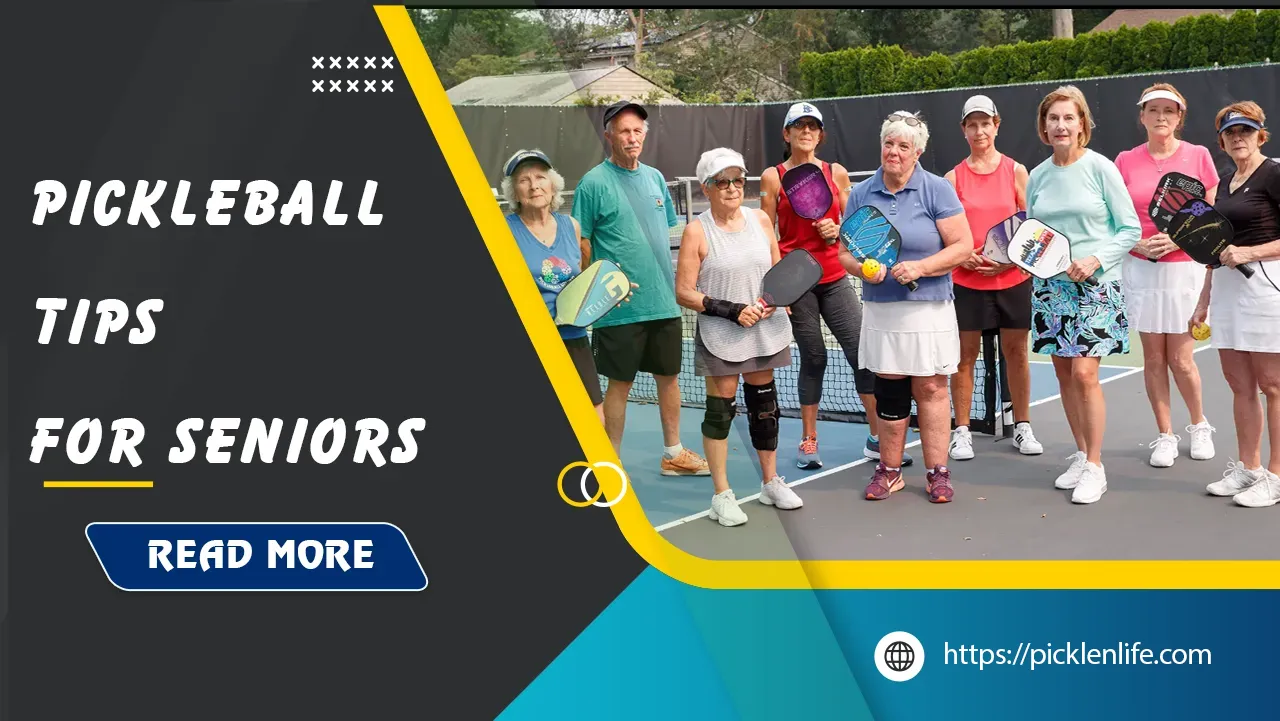
Why pickleball is the perfect sport for seniors
Embracing physical activity is vital at any age, but it’s especially crucial for seniors to maintain their mobility, balance, and cognitive health. Pickleball is a unique blend of tennis, badminton, and ping-pong, offering not only physical benefits but also profound social and mental advantages that are often overlooked.
Physical benefits: low-impact exercise for joints and mobility
One of the most significant advantages of pickleball is its low-impact nature. Unlike other sports that require explosive movements and extensive running, pickleball encourages players to engage in more controlled, gradual movements. This makes it easier on the joints, reducing the risk of injuries often associated with high-impact sports. In a study conducted by the University of Florida, researchers found that older adults participating in pickleball displayed improved flexibility and balance, both crucial for preventing falls, a leading cause of injury among seniors.
Moreover, the smaller court size means less ground to cover, allowing those with limited mobility to engage fully in the game without overstretching their physical limits. As players enjoy themselves while breaking a moderate sweat, they simultaneously work on enhancing their stamina and overall fitness levels.
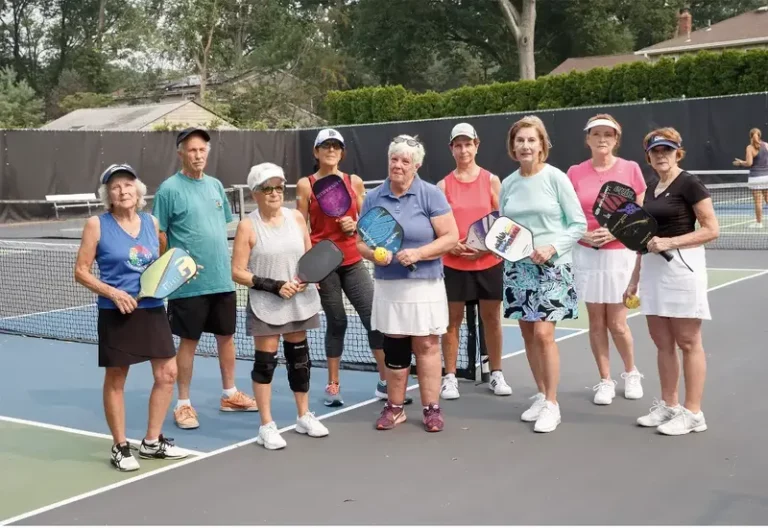
Social benefits: connecting with others and building community
Pickleball transcends the mere aspects of exercise; it fosters connections between players. Engaging with fellow players cultivates camaraderie and community spirit, which are vital for emotional wellbeing. According to the National Institute on Aging, maintaining social connections can significantly lower the risk of cognitive decline and improve mental health.
Seniors can find joy not only in the game but in the interactions that come along with participating in local clubs or leagues. Playing doubles provides opportunities for partnerships, encouraging teamwork and strategic collaboration. Within this community, friendships naturally blossom as players share experiences, offering a warm and supportive environment that enhances the overall pickleball experience.
Mental benefits: sharpening the mind and boosting cognitive function
Further emphasizing its appeal, pickleball requires players to engage their cognitive skills actively. Strategy, quick decision-making, and the need to read one’s opponent stimulate mental activity. Not only does this keep players sharp, but it also serves as a perfect remedy against the cognitive degeneration that can accompany aging.
A study published in the Journal of Aging and Physical Activity suggests that engaging in strategic sports like pickleball can enhance problem-solving skills and improve overall mental agility. By learning to predict an opponent’s movements and adjust their strategy accordingly, players effectively turn each match into a mental challenge, further solidifying the game’s wellness benefits.
Getting started: essential gear and fundamental techniques
Starting a new sport can often be overwhelming, especially for seniors who may feel daunted by physical activity. However, grips and paddles tailored for beginners can set your game up for success. Understanding the equipment and basic techniques will make entering the realm of pickleball much more enjoyable.
Choosing the right pickleball paddle
Investing in a lightweight paddle can make all the difference for senior players. Ideally, the paddle should weigh between 7 to 8 ounces, allowing for improved maneuverability and reduced strain on the arms. Additionally, pay attention to the paddle grip size; a comfortable grip leads to better control, enhancing performance on the court.
It’s essential to consider paddle materials as well. Composite paddles are often recommended for their balance between power and touch. With varying core materials like polymer, aluminum, or a composite blend seniors should focus on finding a paddle that feels comfortable and fits their playing style effectively. A well-chosen paddle can serve as your most trusted ally, akin to a trusted companion in your wellness journey.
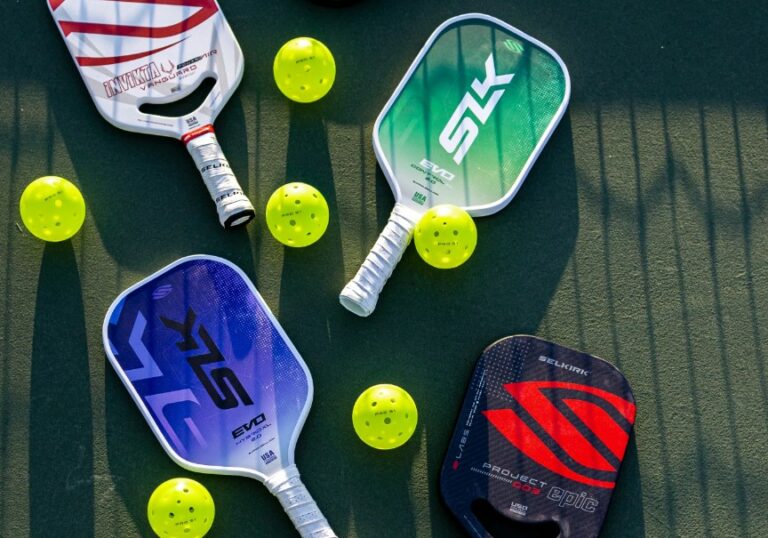
Finding the right shoes and apparel
Footwear choices play a crucial role in pickleball performance. Opt for shoes specifically designed for court sports, as they provide the necessary support and traction essential for quickly changing directions and maintaining balance. Look for shoes with cushioned soles that reduce shock to joints during quick movements.
Similarly, clothing should prioritize comfort; lightweight, breathable materials will keep you cool and allow for unrestricted movement. As players focus on their game, they should feel comfortable in their attire rather than distracted by discomfort due to inappropriate clothing. Thus, investing in the right gear sets the stage for a more enjoyable experience as you step onto the court.
Understanding the basic rules and scoring
Before playing, it’s important to familiarize yourself with essential pickleball rules. Start with scoring, which is typically played to 11 points, needing a two-point lead for victory. Understanding the double-bounce rule and the non-volley zone rules regarding where players can stand during volleys will help clarify your gameplay scenarios. Social gatherings often begin with a few instructional sessions among friends to solidify these basics, making for a more informed and enjoyable match where everyone can contribute effectively.
Movement and positioning: Pickleball tips for seniors
Being light on your feet is crucial in pickleball. Despite being a relatively low-impact sport, understanding movement and positioning can drastically improve both performance and enjoyment on the court.
Getting to the NVZ line: strategies for seniors
Positioning in pickleball plays a significant role, especially when reaching the non-volley zone (NVZ) after serving. A valuable strategy for seniors involves hitting high and deep returns during serves to buy time, allowing for a stored energy advantage. This tactic ensures that players can effectively position themselves within the NVZ, a zone critical for executing strategic volleys while minimizing the need for excessive running.
By mastering this approach, seniors can play assertively and dominate the court, instilling a sense of confidence and ensuring they remain in the game longer.
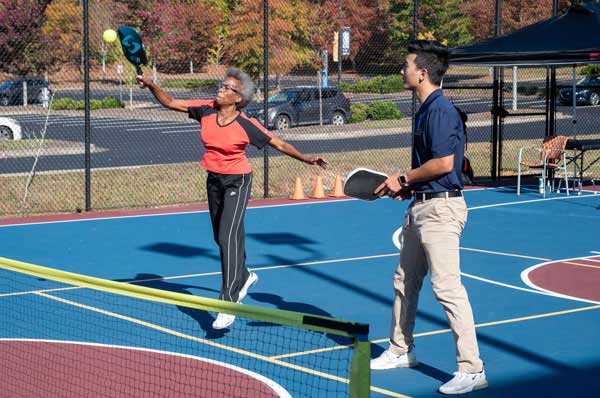
Efficient footwork and court coverage
Every successful pickleball player understands the importance of footwork. Simple techniques like the split step can enhance agility and response time. Split stepping involves a light hop just before your opponent strikes the ball, allowing for a quicker reaction when returning shots.
Moreover, shuffle steps can be beneficial for lateral movement within the court. Engaging in specific footwork drills not only helps seniors move effectively but also aids in maintaining pace while ensuring safety against falls and joint strains. Concentrating on such drills can significantly sharpen one’s overall performance, allowing gaps in the defense to be filled quickly.
Anticipation and court awareness
Court awareness is another vital component of successful pickleball play. Being able to predict your opponent’s shots and strategically positioning yourself can lead to improved performance. By paying attention to their body language and paddle angles, you will be able to anticipate their next move, positioning yourself favorably for an effective counterattack.
This skill is akin to a chess player anticipating their opponent’s moves; it requires both patience and keen observation, ultimately leading to better results on the court.
Strategic play: outsmarting your opponents
When it comes to pickleball, simply playing well isn’t enough developing a strategy that focuses on utilizing skill rather than brute strength is essential, especially for seniors.
Placement over power: the senior advantage
One of the most significant advantages seniors have in pickleball is the opportunity to master placement over sheer power. While younger players may rely on force, precise shot placement often proves more beneficial in a competitive setting. By focusing on accuracy, players can exert control over the game, sending their opponents scrambling rather than setting themselves up for an error-filled volley.
This strategic mindset can be empowering for seniors, allowing them to outwit their opponents and keep their gameplay stress-free and enjoyable.
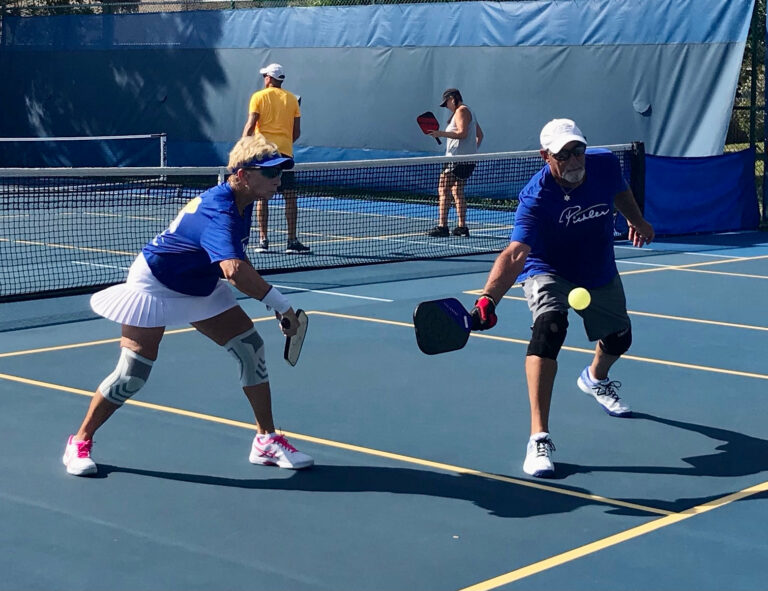
Mastering the soft game: dinking and drop shots
The soft game in pickleball dinking and executing drop shots provides seniors with a unique opportunity to control the pace and flow of the match. Dinks create an often unpredictable and fast-paced scenario for opponents, compelling them to advance toward the net. This tactic requires finesse and precision, which can lead to easy points when executed correctly.
By practicing these shot types, seniors can effectively manage their energy levels while placing themselves strategically on the court, capitalizing on opponents’ mistakes in the process.
Playing against younger, quicker players
Facing younger, quicker players can be intimidating, but it also presents an opportunity for tactfulness. Patience becomes an invaluable asset; by taking time to analyze their play style, seniors can adapt their game. Opting for strategic shot selection and placing the ball in less predictable areas can turn the tide in your favor, allowing you to force errors from your opponents rather than relying on power.
Staying safe and injury-free: protecting your body
With any physical activity, safety is paramount, especially for seniors. Incorporating injury prevention strategies ensures longevity in the sport and enhances enjoyment.
Essential warm-up and cool-down routines
Adequate warm-up and cool-down routines prior to and following games are essential for reducing the risk of injury. Incorporate dynamic stretches such as arm circles, leg swings, and torso twists before hitting the court to loosen muscles and enhance flexibility. In contrast, cool-down exercises like static stretches focused on the hamstrings, quads, and shoulders will help maintain muscle health after play.
Creating a routine around this practice keeps your body in shape and prepared for future sessions while ensuring that movements are fluid and natural.
Recognizing your limits: listen to your body
One of the most vital aspects of playing pickleball as a senior is recognizing your physical limits. Engaging in consistent self-assessment throughout games is crucial; take breaks as needed, particularly if experiencing fatigue or discomfort. Understanding that it’s perfectly okay to step back or bow out from a game is key to long-lasting engagement in the sport physical health comes first!
Keeping hydrated and responsive to your body’s signals is non-negotiable in maintaining your enjoyment of pickleball.
Common pickleball injuries and prevention strategies
Seniors may face certain injuries common in racquet sports, such as ankle sprains, tennis elbow, or knee pain. By adhering to proper techniques and ensuring appropriate equipment, the risk of sustaining injuries decreases significantly. For instance, using a paddle that suits your playing style can minimize strain on muscles and joints.
Additionally, wearing supportive shoes, sticking to a consistent warm-up routine, and actively engaging in rehabilitation exercises can dramatically enhance both performance and enjoyment.
Developing a strong mental game: confidence and focus
Your mindset operates as a powerful tool in your pickleball arsenal. Developing mental strength is just as crucial as physical fitness, shaping how effectively players can adapt and improve their game.
Staying calm and focused under pressure
Playing under pressure can be daunting, but utilizing deep breathing techniques and positive self-talk can maintain a sense of calm. Having a mantra or reminder that encourages you in moments of tension can rekindle focus and confidence think of it as a mental reset during the heat of the match.
A study in the Psychology of Sport and Exercise highlights the positive effects of visualization techniques, which can enhance performance among athletes. Picture yourself executing perfect shots; this mental rehearsal can boost self-belief when it counts most.
Learning from mistakes: turning errors into opportunities
Every player makes mistakes, and learning to view errors as opportunities for growth is essential. Analyzing gameplay post-match, identifying weaknesses, and creating strategies for improvement can transform a setback into a stepping stone. Embracing this perspective fosters resilience and enables continuous improvement, ensuring that every game is approached with a mindset of learning.
Building confidence: believing in your abilities
A positive self-image can significantly impact your game. Setting small, achievable goals and celebrating successes fosters greater confidence, encouraging players to believe in their abilities. Over time, as you build on these goals, you will witness personal and skill growth that reinforces self-esteem in your game.
Advanced techniques: taking your game to the next level
Once you’ve grasped the fundamentals, mastering advanced techniques can elevate your game and provide a fresh challenge.
Mastering the third shot drop
The third shot drop is a strategic move enabling the player to shift the game’s momentum. Executing this shot effectively requires control and practice, as it allows for the opportunity to dictate the pace of play. With a well-placed drop, you can leave opponents off-balance and create a scenario for setting up offensive plays afterward.
Continued practice in this area is vital; gradually refining your technique ensures a strong offensive advantage in matches.
Effective lobbing: when and how to use it
Utilizing effective lobbing techniques can surprise your opponents. Offensive lobs can push your adversaries back, while defensive lobs can give you time to regain your position or reorganize your strategy. It’s essential to practice lob placement and angles, ensuring you can control the tempo while keeping your opponents guessing.
Using spin: adding a new dimension to your shots
Incorporating spin into your shots provides an exciting twist (pun intended!) to your gameplay. Mastering topspin and backspin techniques can help manipulate the ball’s trajectory and bounce, creating unexpected challenges for those across the net.
Experimenting with spin during practice is essential, as it adds another tactical dimension to your playstyle, allowing for greater variability in your shots.
Doubles play: teamwork and communication
The cooperative aspect of doubles is the heart of pickleball for many players. Communication and teamwork can create a synergistic bond that enhances overall performance.
The importance of communication and teamwork
Effective communication ensures smooth play. Using verbal cues or non-verbal signals, such as gestures, can help partners anticipate each other’s movements and actions. Good teams adapt their strategies based on strengths and weaknesses, allowing them to combine efforts fluidly while establishing rhythm in their gameplay.
Developing this synergy can leave opponents at a disadvantage, as cohesive teams can strategize plays rapidly and maintain pressure while remaining positioned perfectly together.
Effective positioning and court coverage
Understanding positioning within doubles play is vital for maximizing efficiency. Coordinating movements and formations allows for better court coverage, reducing gaps and ensuring effective responses to shots.
Exploring formations, such as side-by-side or stacked, and discussing responsibilities can improve teamwork and communication. By mastering these dynamics, healthier partnerships arise, strengthening both technical prowess and social bonds.
Switching and poaching: advanced doubles tactics
Switching and poaching strategies can add layers of complexity to your game. By predicting your partner’s movement, timely switches can surprise opponents and create scoring opportunities. Similarly, mastering the art of poaching intercepting a shot meant for your partner requires trust and communication. It can be a fabulous way to capitalize on an unsuspecting enemy!
Training in these advanced techniques ensures senior players can take their skills up a notch, creating thrilling game moments.
Training and practice: improving your skills
Consistent training and practice enable improvement and confidence in your gameplay, making these aspects vital to long-term success in pickleball.
Drills for seniors: building techniques and confidence
Setting aside time for drills tailored specifically for seniors can enhance finite skills critical to play. Focused exercises targeting serves, dinks, volleys, and strategies can allow for engagement with gameplay concepts while refining technique.
Over time, as seniors rehearse these drills, confidence builds leading to improved performance and skill transition into competitive matches.
The value of practice games and match play
Participating in practice games or match play against varying skill levels enriches gameplay exposure. Adapting to different styles can aid seniors in developing their strategic approaches. These variations keep practice sessions engaging, allowing players to experience diverse scenarios, ultimately fostering growth and understanding.
Cross-training: enhancing your pickleball performance
To improve overall performance, engaging in cross-training exercises can significantly enhance strength, flexibility, and balance. Activities such as swimming, yoga, or Pilates complement pickleball-specific training, producing more balanced athletes.
Investing in your physical fitness holistically reinforces your performance on the court while promoting overall well-being.
Pickleball community and resources: connecting and learning
Finally, finding a supportive community and utilizing resources ensures a fulfilling pickleball experience.
Finding local pickleball groups and clubs
Joining local pickleball clubs or community centers introduces players to fellow enthusiasts and provides continuous opportunities for practice and games. Look for recreational leagues or social events in your area that promote engagement. These gatherings lay the groundwork for friendships built on shared interests while paving the way for ongoing gameplay opportunities.
Utilizing online resources and platforms
Today, a wealth of resources is available online, including instructional videos, resource websites, and coaching forums. Exploring these platforms can offer invaluable insights, techniques, and strategies that enhance your gameplay experience while ensuring continuous learning.
Pickleball tournaments and events for seniors
Participating in senior tournaments shouldn’t be overlooked. Not only do these events challenge your skills, but they also serve as social outings, creating enjoyable experiences while promoting competitive spirit. Many tournaments are held regularly, allowing seniors to not just compete but also discover camaraderie and fun.
Conclusion
As you delve into the vibrant world of pickleball, remember that the journey entails both individual improvement and communal connections. By following these tips, seniors can cultivate a love for the game, prioritizing safety and enjoyment, while developing skills that will lead to a fulfilling experience on the court. Pickleball is more than just a sport; it’s an opportunity to nurture health, relationships, and joy. So grab your paddle, connect with fellow players, and embrace the benefits of this incredible game, knowing that age is just a number as you embark on each new match!
